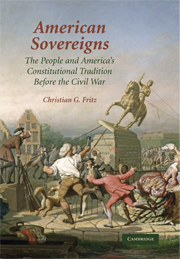Book contents
- Frontmatter
- Contents
- Acknowledgments
- 1 Prologue
- PART ONE THE PEOPLE'S SOVEREIGNTY IN THE STATES
- 2 Revolutionary Constitutionalism
- 3 Grassroots Self-Government: America's Early Determinist Movements
- 4 Revolutionary Tensions: “Friends of Government” Confront “The Regulators” in Massachusetts
- PART TWO THE SOVEREIGN BEHIND THE FEDERAL CONSTITUTION
- PART THREE THE STRUGGLE OVER A CONSTITUTIONAL MIDDLE GROUND
- Key to abbreviations
- Notes
- Selected Short Titles
- Credits
- Index
4 - Revolutionary Tensions: “Friends of Government” Confront “The Regulators” in Massachusetts
Published online by Cambridge University Press: 31 January 2011
- Frontmatter
- Contents
- Acknowledgments
- 1 Prologue
- PART ONE THE PEOPLE'S SOVEREIGNTY IN THE STATES
- 2 Revolutionary Constitutionalism
- 3 Grassroots Self-Government: America's Early Determinist Movements
- 4 Revolutionary Tensions: “Friends of Government” Confront “The Regulators” in Massachusetts
- PART TWO THE SOVEREIGN BEHIND THE FEDERAL CONSTITUTION
- PART THREE THE STRUGGLE OVER A CONSTITUTIONAL MIDDLE GROUND
- Key to abbreviations
- Notes
- Selected Short Titles
- Credits
- Index
Summary
Under arrest and awaiting trial, Dr. William Whiting pled his case to Massachusetts's Attorney General Robert Treat Paine in 1787. The two were hardly strangers. As a congressional delegate during the Revolutionary War, Paine had lobbied for the home manufacture of saltpeter – used in producing gunpowder and something that both Paine and John Adams considered of crucial military importance. Much of the success in stimulating domestic production of saltpeter they attributed to Whiting's efforts. At the time, Paine called him “my friend” and proclaimed that “the world knows your merit.”
The doctor questioned the charges he faced. The Commonwealth accused him of encouraging the people's disaffection, hatred, and contempt of the government – the crime of sedition. Three weeks before his letter to Paine, the Massachusetts Senate recommended Whiting's removal from office for conduct “derogatory to Government.”
As a prominent physician in revolutionary Massachusetts, Whiting had recently served as chief justice of the Berkshire County Court of Common Pleas. His judicial tenure came to an end in 1787 with his arrest after authoring two essays sympathetic to protesting farmers. Those farmers closed his court in Great Barrington until the state legislature considered their grievances. The closing came at “the point of Bayonets,” Judge Whiting explained to the attorney general, and he yielded despite his great “aversion to mobs riots tumults & Insurrections.”
- Type
- Chapter
- Information
- American SovereignsThe People and America's Constitutional Tradition Before the Civil War, pp. 80 - 116Publisher: Cambridge University PressPrint publication year: 2007

